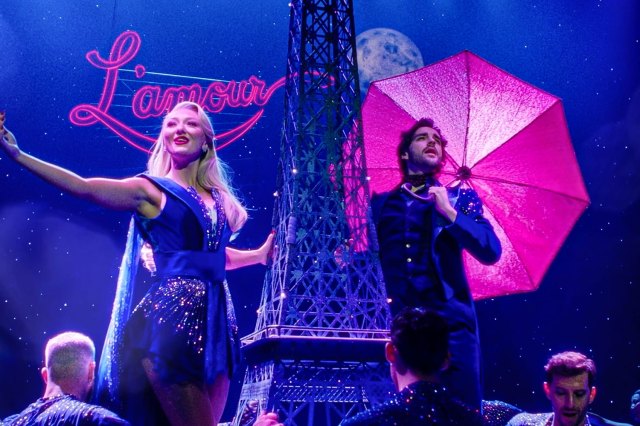Full Monty
Your heart sinks at first as The Full Monty kicks off with a female cheerleader egging on a crude male strip, care of a script that sounds like it might be taken from a cartoon strip. But get beyond those first ten minutes and you’ll be absorbed into a show about real people that’s properly plot-driven, warm-hearted, generous, hard-edged and soft-centred.
This is a musical of human values in the best sense, about underdogs who empower themselves even while society is challenging their abilities to be fathers, husbands and providers. In the midst of these family values, its creators – including scriptwriter Terrence McNally and director Jack O’Brien, both of them gay – have also snuck in a very affirmative portrait, of a gay couple finding each other, that’s the best kind of matter-of-fact acceptance I’ve ever encountered in a mainstream musical.
When this Broadway import first opened in London, its six leading men of steelworkers-turned-strippers were all American, five of them from the original Broadway cast newly joined by the handsome Broadway leading man Jarrod Emick. All were invaluable, but in particular John Ellison Conlee as Emick’s overweight best friend and Andre de Shields as a ‘Big Black Man’ who fears that he doesn’t live up to that title stood out.
Now they’ve gone home, an all-English cast has succeeded them, and it’s a pleasure to report that the show is every bit as pleasurable as before. Conlee and de Shields were tough acts to follow, but David Ganly (not quite as chubby but just as vulnerable) and Cornell John (not quite as old but just as funny) are admirable replacements for the two previous star turns. Emick, meanwhile, is succeeded by an equally handsome local leading man, Ben Richards, who continues his run of major take-overs (last seen in Saturday Night Fever after Adam Garcia, though it’s surely time he should be given the chance to originate a leading role in the West End.
Paul Keating – his hair now restored after La Cava and Closer to Heaven – is in good shape and touchingly funny as he repeatedly tries, and fails, to execute a Gene Kelly dance routine, while Samuel James is charming as the suicidal mommy’s boy who finally finds love. Tony Timberlake is now the former factory supervisor trying desperately to keep his wife from knowing their change in circumstance.
The rest of the Buffalo townsfolk remain the same, except for the terrific replacement of Lynda Baron as the old-timer pianist who coaxes the boys through their routine. Dora Bryan‘s faltering and eccentric panto turn in the role was one of the production’s few weak spots before; now the show delivers a full monty that’s full in every sense, and (though it’s still hard to tell in the near dark of the closing moments), one that’s probably uncut, too.
Note: The following review dates from March 2002 and the production’s original West End cast.
Leave behind any possessiveness about the low-budget British film of the same name. In this new stage musical, Sheffield has been swapped for Buffalo, New York. The creators argue that the story is a universal one and could work anywhere. And for the most part that’s true.
In fact, the story – about unemployed steel workers who resort to male striptease for cash – works so well that the bulk of the scenes and much of the dialogue has been recycled wholesale. Aside from the setting and cultural in-jokes, the only real changes in Terrence McNally‘s book are the introduction of an extra character (a sozzled old trouper, played by Dora Bryan, who drills the boys), the move of spontaneous jigging from dole queue to graveside and the excising of the Hot Chocolate-led soundtrack.
In place of old pop classics, we’ve got original songs by David Yazbek whose fairly unremarkable tunes are elevated by some wryly remarkable lyrics. In “Man”, a lament on the state of the modern male, for example, Yazbek effortlessly rhymes ‘malicious’ with ‘dishes’. Meanwhile, “Big-Ass Rock” is nothing to do with heavy metal but rather an ironic ditty about friends helping friends commit suicide, preferably by knocking skulls with the rock of the title. Very clever.
In this British premiere, the male leads are filled by Broadway names. Jarrod Emick, as Jerry (the Robert Carlyle character in the film), oozes all-American maleness. He’s a crack-open-a-brewski-and-zap-on-the-Superbowl-one-of-the-guys guy. And if Emick’s own physique (the word buffed comes most readily to mind) works against his character’s hesitancy to bare all, his other insecurities – primarily about his son – remain undiminished.
Emick also exhibits a wonderful rapport with John Ellison Conlee, who plays his tubby and sweetly undermined best friend Dave. The rest of the stripping six all perform admirably too, especially Andre De Shields, as a creaky 40-something, who shines in a showstopper about his assets as a “Big Black Man”.
Director Jack O’Brien keeps things zipping along, though he might have zipped more quickly through the overlong first act, and Jerry Mitchell‘s choreography is deceptively simple, given that the characters are meant to be men who can’t dance. Particularly brilliant is the rehearsal number in which the guys get into the groove by pretending to dribble à la Michael Jordan (about the only basketball player most Brits could name).
Yes, it just about all works. And yet, I can’t help feeling that some of the poignancy of the film has been lost. While we’ve got plenty of emasculation and gender gibes, the underlying themes about class and the sheer desperation of British men resorting to something so unBritish as stripping – which requires them to drop their reserve as well as their trousers – just don’t ring true in an American setting.
Ah well. As the finale intones, “let it go”. And it is quite a finale – unlike the original, they do indeed do the full monty.












